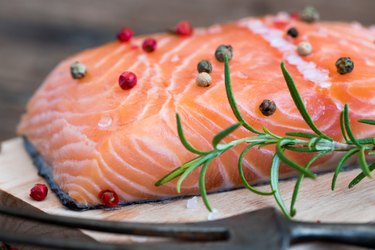
Gout is a condition that causes inflammation and pain in your joints. This arthritic condition most commonly affects the large joint in your big toe, although pain and swelling also may occur in other joints of your feet, legs, hands and arms. Diet plays a major role in the development of gout symptoms. Eating foods that contain L-arginine may increase your risk of a gout attack, especially if this form of arthritis runs in your family.
Gout
Video of the Day
The most common symptom of gout is the sudden development of severe pain in a single joint. In addition to this intense discomfort, the affected joint may feel hot and appear red and shiny. During a gout attack, you may run a fever of around 102 degrees F. Although a family history of gout is one of the most prevalent risk factors for developing this condition, drinking too much alcohol, undergoing surgery, having metabolic syndrome, as well as eating a diet high in purines, can all increase your risk.
Video of the Day
L-Arginine
L-arginine is an essential amino acid that you must obtain from food sources or supplements. Certain medical conditions, such as congestive heart failure, coronary artery disease, senile dementia and erectile dysfunction, may benefit from medications that contain L-arginine. According to MedlinePlus, some research indicates that L-arginine may be effective in the treatment of bladder inflammation, angina pectoris, weight loss in AIDS patients and digestive tract inflammation in infants. During metabolism, your body converts L-arginine to urea. Urea is the forerunner to uric acid, the substance that promotes the formation of crystals around joints during a gout attack.
Diet
Natural sources of L-arginine include red meats, such as beef and lamb, as well as poultry and fish. Dairy products also contain varying amounts of L-arginine. Meat is a rich source of purines, the substances that promote the formation of uric acid. Reduce your risk of gout symptoms by eating fewer red meats while increasing your consumption of fruits, vegetables, barley and oats.
Precautions
Tell your doctor about any unusual swelling and pain in your joints, especially if you have never been diagnosed with gout or don't have a family history of this disease. Other conditions, as well as injuries, may cause similar types of pain and swelling in your joints. L-arginine may cause gout, along with other potential side effects, such as bloating, abdominal pain, airway inflammation and diarrhea.